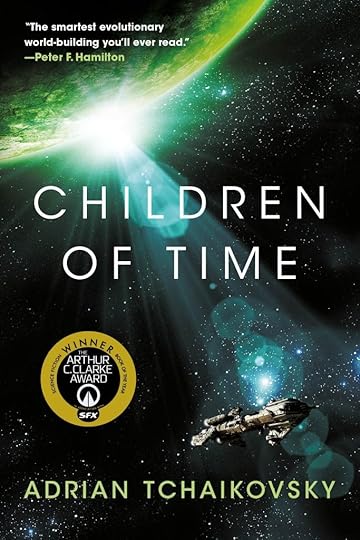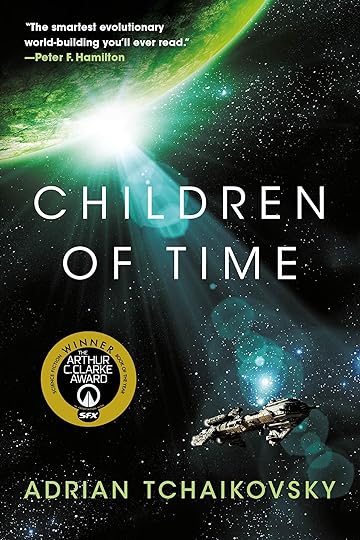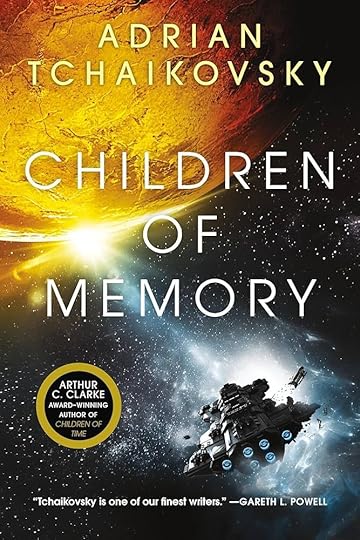Book Review: Children of Time

My main take-away after reading the enormous (600-page) sci-fi Children of Time by Adrian Tchaikovsky: this is a tale of two styles. The story jumps back and forth between a group of humans on one of the last spaceships in the universe (concentrating on one character, Holsten), and the intellectual and social development of newly sentient alien spiders. I enjoyed the story about the humans. The alien-spider story was dense with details, supposed science, and the historical minutiae of their world. While the concept was intriguing, no thanks. I would have preferred a continuation of the more involved-reader style of the human parts. And moreover, for me it felt like driving home the historical points way too much. Because that’s how I also read this book: as a (thinly veiled) commentary on/retelling of human history. I was almost completely alone in this at book club, like I’m Dr. Kern floating around in a rocket for one, slowly going bonkers…
But I’m totally right. My monkeys! It’s a story about personhood and human nature.
Humanity has fled a dying Earth for the stars and its far-flung terraforming projects. Unfortunately, only one of those projects appears to have worked, and when the humans arrive, they are greeted by giant intelligent (and violent) spiders and a half-human, half-AI guardian hell-bent on a future without one shred of the old humanity. Holsten is just a classicist, but every hundred years or so he gets woken from cryo-sleep and thrown into some fresh chaos in the long-game to reclaim the planet. Meanwhile, the spiders are growing, learning, adapting, and slowly coming to understand that it’s their species or the humans.
Like the characters (human and spider) in this book, I had a journey during the reading of this (again giant) book. I generally like speculative fiction, but I lean more toward fantasy than sci-fi. But I have liked many sci-fi books anyway. Despite its 600 pages and the two months we had to read this one, I was excited because my book club friend said it was one of his favorites. So I jumped right in.
Yeah, not my cup of tea. Somewhere in the first quarter of the book, I started checking out during the spider chapters. I acknowledged the awards (Hugo and Arthur C. Clarke). I saw the ratings (4.3 on Goodreads). But I had basically given up reading with my eyeballs and went to my backup for books I insist on finishing even when I’m slogging through, which is the audio version (where I get trapped in the car with it and forced to continue). While driving in the car with me, my husband—who reads largely scifi and history and loves both scifi and the natural world—agreed: I cannot feel the same way about sentient spiders as I do about humans and there is way too much telling and world-building.
There are two types of speculative fiction reader, after all. There is the high-fantasy kind of reader (I can’t seem to figure out what the sci-fi equivalent of this is called) and there is the low-fantasy kind of reader. But maybe that’s not exactly what I mean. The distinction is more in the level of showing versus telling, in the depth of the details given for the world-building. The Lord of the Rings is clearly high fantasy, but it is borderline when it comes to telling me stuff versus simply immersing me and telling me a story. It is nowhere near the level of backstory deets that are in Children of Time (only related to the spiders, not the humans). The human stories require a significant level of filling in the gaps, of figuring things out with Holsten, just concentrating on the story that is being told. The funny thing is that we had an extra-large turnout for book club this month (it is January) and out of something like 50 people I was one of only two (!) who liked the human story better than the spider story. In fact, several people mentioned they understood the spider bits more and needed all those words and details. Meanwhile, I am hardcore a believer of spec fic writers leaving most of the world-building in the filing cabinet at home. I way more enjoy being an involved, participatory reader and for the writer to honor my intelligence and imagination. But for those of you who need more detailed, direct writing, I see you. I can respect it.
That doesn’t mean I have to enjoy reading it.
There is also a difference between world-building and setting, which I have been thinking about a lot lately. World-building is the creation of a cohesive structure on which to hang a story. Creating a setting gives the reader’s imagination scenery in which to visualize the characters and actions. You see the difference? I can admit to using the two terms interchangeably at times, but some writers do one really well while doing the other horribly. Tchaikovsky does his darndest and really impresses with his world-building (especially with the spider planet and culture). He concentrates much less on setting, tone, individual scenes. As a reader, I am happier in a story that paints elaborate, vibey settings with few, very effective brushstrokes and honors things like spatial consistency, exterior mood-setting, and the mind’s eye (as well as impressive, poetic word-smithing). Tens—no, hundreds—of pages about dry spider history is never gonna do it for me. (I was literally rolling my eyes.) I do not like to be spoon-fed. But it does it for plenty of others.
The funny thing is that I almost (almost!) changed my tune by the time the audio book narrator wrapped this one up for me. Because the story overall and my enjoyment of the human part of the story had me actually enjoying the ending (which I did see coming but was still tense and exciting right up to the last moment). And I could appreciate the enormity of what Tchaikovsky accomplished here in pure scope, in innovative story-telling, in an enormous vision. And in those memorable scenes! I hadn’t thought of it along the way, but there are some scenes that are pure horror and they stick with you. There are also super fun moments that blow the lid off when it comes to cinematic storytelling. Honestly, I love stuff like that. But while I felt satisfied in the end, I have to be HONEST about my journey, which was an uphill one, many chapters a tramp through the never-ending mud.
I get it! I see you history of world wars. Slavery. I see you development through proto-humans. I see you patriarchy being shown to us flipped upside down as a matriarchy.
In the end, I couldn’t be as hard on it as I wanted to. I enjoyed the ending. I appreciated so much about it including its daring, its uniqueness, its epic moments/scenes, its sheer length of plot arc. How much others enjoyed it. If 200 words had been cut from the spider chapters and the POV and tone shifted so that it was more narrative, then it would have been a real win for me. It has been made clear to me that I would be one of the only ones celebrating these changes.



By the way, I heard that the series (Children of Time, Children of Ruin, Children of Memory) is connected unconventionally, like Ender’s Game and the Ender Quintet (or Saga). So they can each stand alone. I am happy, then, to leave this series here. It’s possible someone could talk me into reading more, but for now I am moving on to other books and series. I will for sure remember this one. I will remember what I admire about it, as well as what I slogged through. And I would be happy to recommend it to people who like this sort of thing, which are legion.



